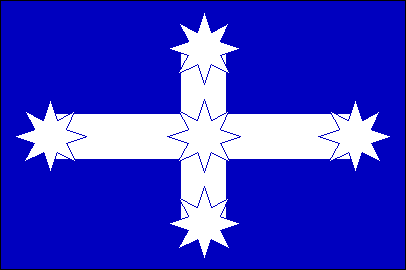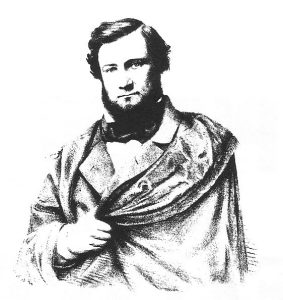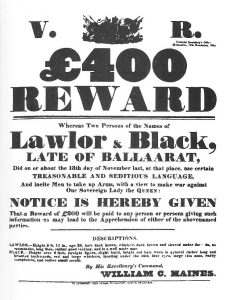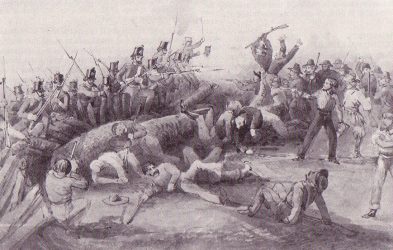 |
|
In the early 1850s, the Victorian gold miners suffered under a number of injustices. They were without political rights; they were not entitled to vote in elections, and were not represented in the Legislative Council (the Victorian parliament). In addition, land for settlement was not readily available to them: the dispersal of Crown Land was effectively controlled by the landed gentry, squatters, and merchants (1). However, the miners' main grievance was the exorbitant cost of the gold mining license. Many miners found it almost impossible to pay the licensing fee as their finds were often scarcely sufficient to provide for the basic necessities of life (2).
The administration of the license system created further anger and made the Ballarat gold-fields' police the object of much hatred. "License hunts" involved a large number of police swooping down on a particular area of the gold-fields and arresting any miner who could not immediately display a license. Miners who had left their license in their tent, a common practice due to the often wet and filthy conditions in the mines, could be arrested. Those found without licenses were liable to fines, or even imprisonment for subsequent convictions. The policeman making the arrest received half the fine; a situation which invited abuse. In addition, many of the gold-fields' police were ex-convicts from Tasmania, who were often inclined to brutality and violence in their treatment of the miners (3).
These injustices created an atmosphere of anger and discontent that was exacerbated by the Bentley incident. In early October 1854 a Ballarat publican, James Bentley, was charged with the murder of a miner, James Scobie. Bentley was subsequently acquitted of the charge, due chiefly to the insistence of the Police Magistrate, Magistrate Dewes, who was known to owe money to the publican. Popular opinion was that Bentley was guilty. A subsequent meeting of around 5000 miners bitterly attacked the acquittal decision and the frustrated diggers then sought revenge by burning Bentley's hotel to the ground. After this incident, three men were imprisoned as the "ringleaders" of the riot (4).
On November 11th, a massive public meeting marked the official founding of the Ballarat Reform League. Many miners attended because of the Bentley incident, however, the meeting soon became political in nature and resolved to approve the aims of the League, as follows:

Peter Lalor Leader of the Rebellion at Eureka |
The demands for democracy from the diggers were essentially of Chartist origin (the Chartists were the democratic people's movement in England, who were advocating democratic demands - as listed in their "Charter"); indeed, there were many diggers at Eureka, such as Humffray, who were considered to be Chartists.
A deputation was sent to Lieutenant-Governor Charles Hotham to demand political reform, land reform, abolition of the miners' license, and the release of the three "ringleaders" of the hotel burning incident. These demands were refused. The deputation reported to a mass meeting of 10,000 diggers on Wednesday November 29th. At this meeting, the Eureka Flag was raised for the first time and the diggers pledged to burn their licenses and to protect one another against the police (7).
The following day, Goldfields Commissioner Rede ordered a license inspection. As a consequence, fighting broke out between miners and the police. The military were then summoned to quell the miners and several diggers were arrested for failing to produce a license. Later that day another meeting was called, and - standing beneath the Eureka Flag - Peter Lalor organized the diggers into companies (8). The next day (Friday, 31 November) the diggers met at Bakery Hill, eventually numbering about 1500 men, following which they marched to Eureka, where Lalor was elected leader of the miners. On Saturday, the miners enclosed an area where they could muster and drill: the so-called "Eureka Stockade". In fact, this enclosure was not meant to be a military stockade or fortress. In the words of Lalor: "it was nothing more than an enclosure to keep our own men together, and was never erected with an eye to military defence". Lalor had already outlined a plan of self-defence whereby, "if the government forces came to attack us, we should meet them on the Gravel Pits, and if compelled, we should retreat by the heights to the old Canadian Gully, and there make our final stand". To this end, the miners posted scouts and sentries throughout the diggings to provide early warning of an impending attack (9). Word was also sent to the diggers on the goldfields at Bendigo, Castlemaine, and Creswick, and digger reinforcements were expected from those areas. Indeed, on the 1st of December 300 to 400 volunteers from Creswick arrived at Eureka (10).

|
It was on Sunday, the 3rd of December 1854, that the Battle of Eureka took place. On the previous day there had been about 1500 men in the enclosure. However, by Sunday the 3rd, many had temporarily left on the Saturday evening for various reasons, such as to search for food and ammunition. Teddy Shannahan, who had a store within the Stockade, said that the Stockade was very short on food, drink, and accomodation; and that on Saturday night (2nd December) "large numbers of the men were constantly going out of the Stockade, and as the majority got drunk, they never came back... The 500 or 600 from Creswick had nothing to eat, and they, too, went down to the Main Road that night". One writer suggested that "Others may have left because they were exhausted, or over-complacent, or because they wanted to go to Mass on Sunday. Carboni hinted darkly at treachery, but named no names". Lalor estimated that 120 diggers remained in the enclosure; other estimates ranged between 100 and under 200 (11). The number of diggers in the Stockade had been further depleted when about 200 armed diggers had, on the 2nd of December, gone to intercept the military reinforcements the were believed to be on their way from Melbourne (12). Therefore, having been told by their spies that there were very few diggers now left inside the Stockade, Gold Commissioner Rede and Captain Thomas, the military commander, decided to mount a surprise attack. At about 3 o'clock on Sunday morning, the combined military and police forces silently approached the diggers' encampment, and got to within 300 yards of the enclosure before the alarm was raised. The soldiers then stormed the Eureka Stockade and despite fierce resistance by the miners - many of whom were asleep when the attack commenced - the rebellion was crushed within about 15 minutes (13). The troopers and police then went wild, destroying tents and property without reason, bayoneting the wounded, and shooting innocent bystanders (14). The aftermath of the battle has led many to describe Eureka as a massacre (15).

|
About 120 diggers were arrested (many innocent of any involvement with the rebels) and eventually thirteen of them were charged with High Treason, but despite the evidence against them, not one of the diggers was found guilty. However, the Editor of the Ballarat Times newspaper was given 3 months imprisonment for sedition. Peter Lalor and the other rebels who had escaped from the stockade emerged from hiding after a general amnesty was declared on 9th May 1855 (16). Peter Lalor, who had lost his left arm due to shots received during the battle, was elected to the Legislative Council on 3rd October 1855, in 1856 was elected to the new Legislative Assembly, and in 1880 he was elected Speaker of the Legislative Assembly (17).
The Eureka Stockade incident, although originating from demands for fair treatment and justice for gold miners, took on political aspects of great significance, as a turning point in our progression to a democratic state. Dr. H.V. Evatt, leader of the ALP, wrote that "The Eureka Stockade was of crucial importance in the making of Australian democracy"; Robert Menzies, later Liberal Prime Minister, said that "the Eureka revolution was an earnest attempt at democratic government"; and, Ben Chifley, former ALP Prime Minister, wrote that "Eureka was more than an incident or passing phase. It was greater in significance than the short-lived revolt against tyrannical authority would suggest. The permanancy of Eureka in its impact on our development was that it was the first real affirmation of our determination to be masters of our own political destiny" (18). The Eureka rebellion was also a protest against Imperial interference, an expression of support for Australian independence, and it included a strong undercurrent of republicanism (19).
As historians later noted:
"Meetings in Melbourne and on the other diggings condemned the attack on the diggers. Licence hunting almost ceased and no jury could be found willing to convict the thirteen arrested miners of treason."
"It was clear that public opinion favoured the diggers and Hotham sought refuge in the Gold Fields Royal Commission which was now urged to speed up its inquiries. The Commission's report led to the reforms of the goldfield's laws and gave the diggers almost all they had asked for. The digger's licence was abolished and replaced by a miner's right costing one pound a year. Possession of this gave the digger the right to mine gold and to vote in elections to parliament..."
"The long term results of the Eureka battle were less obvious and have led to much controversy. Eureka did not affect the details of the new constitution for the colony of Victoria which was approved by the British parliament in July 1855, but it did affect its implementation. The 1854 bill to extend the Elective Franchise required that diggers had to have a 12 month miner's licence to be able to vote, which cost £8 (which was a large sum in those days, and most bought a licence for no more than 3 months), and they had to have been resident in the same place for 6 months before their voting registration could be considered (which was nigh impossible for those of the mining population who were so often "on the move" from goldfield to goldfield); this was, in effect, as the miners' representative George Black stated to Governor Hotham, the "virtual disenfranchisement of the diggers". Instead, the reforms that sprang from the Goldfields Commission gave the possessors of a 12 month Miner's Right (costing £1) the right to vote; and, instead of having to wait for a new constitution, 8 new elected positions for the Legislative Council were created (rather than just 1 as Hotham had spoken of). The Eureka Rebellion not only changed the gold licencing system, it also assured the introduction of widespread manhood suffrage. It was the spark which stirred public interest in government policies. It was now impossible for a government to ignore popular opinion."(20)
It is worthwhile noting that it was the Eureka Rebellion which indirectly led to the implementation of the first stages of the colonial White Australia Policy. Various troubles were occurring on the goldfields in the early 1850s, such as those at Reid's Creek (1853), Bendigo (1853), and Ballarat (1854), and the underlying problems needed to be solved; but it was the Eureka Rebellion which set things in motion.(23)
The Colonial Secretary of Victoria told the Legislative Council on 31 October 1854 that it had been decided "to institute a commission to enquire into the general management of the goldfields", but the matter was continually postponed, and hardly any preparations were made for it. Indeed, Hotham later admitted that the members of the Commission were unwilling to absent themselves from the Legislative Council where "matters of moment" were being discussed. It can well be imagined that such a Commission could take months to swing into action, that it not carry out its mission in full, and when its work was completed that its report would be largely ignored. But after the Eureka Rebellion occurred on the 3rd of December 1854, the Letters Patent appointing the members of the Goldfiels Commission was signed and sealed on the 7th of December. And when the Goldfields Commission handed in its Report, the deaths and carnage that had occurred at Eureka ensured that its recommendations were closely listened to; and, indeed, all of its major recommendations were carried out.(24)
Following recommendations made by the diggers of the various goldfields, the Goldfields Commission's report advocated the restriction of further Chinese immigration. The report stated that:
"A most serious social question with reference to the gold-fields, and one that has lately crept on with rapid but almost unobserved steps, is with reference to the great number of the Chinese. This number, although already almost incredible, yet appears to be still fast increasing... The question of the influx of such large numbers of a pagan and inferior race is a very serious one... The statement of one of this people, that "all" were coming, comprises an unpleasant possibility of the future, that a comparative handful of colonists may be buried in a countless throng of Chinamen... some step is here necessary, if not to prohibit, at least to check and diminish this influx".(25)
Today's rebels are not fighting a system of gold licensing; they are struggling against something far more insidious and dangerous: the Asianisation of Australia. The Establishment is again using police-state tactics; but instead of "license hunts" it now organizes "racist hunts". This attempted suppression of free speech is evident in the quasi-fascist racial vilification legislation, which is purely and simply an attempt to circumvent the activities of Australian Nationalists.
The Australian Nationalists' struggle today is one that promises to be as difficult, if not even more so, as the struggle of the diggers in the 1850s. We face an Establishment that comprises a Traitor Class hell-bent on the destruction of Australia, which they seek to achieve through mass immigration, Multiculturalism, and Asianisation. Their cosmopolitan-internationalist ideology is as wrongful as it is evil (is it not evil to seek the genocide of the Australian people?). Just as there are those who demand the continued existence of the Aboriginal People, we are entitled to demand the continued existence of the Australian people. We have no wish to be subsumed into the teeming masses of Asia. Our fight, like that at Eureka, is on the side of justice and righteousness.
Just as the diggers eventually won their struggle, so shall we.
In the spirit of independence, justice, and democracy that is evoked by the memory of the Eureka Rebellion, we call upon all true blue Australians to join the fight against those who would destroy Australia.